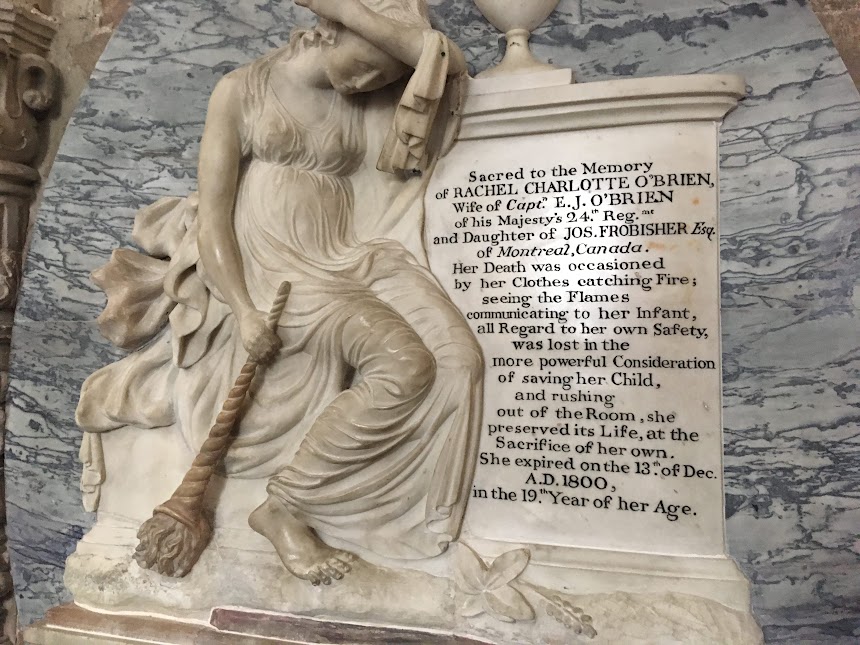This Week’s Bit of String: A dentist’s rocking horse
My Grandma once told me a story about going to the dentist as a kid. She needed a cavity drilled, and the dentist promised if she was good, she’d get to ride on the rocking horse in his waiting room.
He then commenced to drill her tooth without numbing it. She found it very unpleasant, and was told afterward that she was not good, so no rocking horse ride for her.
I wish I remembered the context of why she told me about that. It’s funny how we can be bitter about rules, but still play by them, because I think she worked very hard to stifle all kinds of fuss.
There are times when uttering a complaint or even an honest dissent won’t be much use. Everyone’s got problems, so why would we expect other people to listen to ours? But how much we express ourselves is not a mark of how “good” we are.
Martyrs
I was reminded of my grandmother’s story while I wandered around Exeter Cathedral this week. I like reading the different memorial plaques and trying to imagine who these people really were. What were their daily lives like?

I seek words on women’s graves particularly. They don’t often get much. Birth and death dates, husband’s and father’s names. Most common adjectives are “beloved” and “amiable.” Those with their own plaques get an addendum about which male relative cared enough to commission it. Lends it credibility I suppose. And if any suffering is admitted, we’re assured she bore it with Christian fortitude and never complained.
Whew, because that’s what I REALLY wanted to know about the deceased: did they keep their mouth shut while wasting away?
If the women who suffered patiently were from families wealthy enough to afford marble plaques in cathedrals, they may have been able to afford laudanum or something. It might not have been just Christian fortitude. Plus, they were probably so indoctrinated with a “stiff upper lip” mentality, it might not have occurred to them they were allowed to complain.
A narrative of good versus bad lends purpose to chaos. It must have strengthened survivors to perceive fatal illness and injury as a test which their loved ones passed.
One striking 1800 memorial to a 19-year-old wife portrayed her as a martyr for getting immolated in her own clothes. She was afraid the fire would spread to her baby, so she ran from the room. It leaves the story there, focusing entirely on her “self-sacrifice,” and shocked me with its bleakness. There was nothing else to be done once her clothes caught fire, but die? The only choice she had was how many she took with her? Damn.
Change
There’s almost a palpable air of acceptance around all these things. If men had to wear wide skirts and petticoats and work close to the fire, would things have changed a bit quicker? Maybe it was easier for a few to dish out some cash for nice plaques than for them all to alter the hierarchies of domesticity.

All this reminds me not just how fleeting life can be—one woman came back from several years accompanying her husband on duty in India, to die of illness [silently-withstood, of course] three days after her long-awaited return home—but also to check that full stories are being told, and voices being heard. This is especially relevant as elections loom in the U.S. and as we long for them in the U.K. after getting our second unelected leader (third if you count the new monarch!) in less than two months, as Iranian women and their allies risk their lives just to dress how they want to and Ukrainians face a winter under attack.
There’s no rule that says we have to accept corporate greed, rampant gun culture, environmental degradation, lack of medical care, and falling education standards. Tax breaks offered by conservatives are just a rocking horse ride in the waiting room and they’ll offer no anesthetic for government regulations of bodily autonomy, for privatised essentials, shameless racism and lack of gun control. It doesn’t take much sacrifice from each of us to ensure other people are looked after.
Paying more in energy bills can help keep sanctions on Putin, and paying a bit more in taxes might help provide relief for those who struggle with price hikes. These are better than sacrificing Ukrainian independence or consigning people to poverty or forced pregnancy. The world’s clothes have caught fire but we can still contain the damage.
Yes, some of the options suck, sometimes we’re stuck with the lesser of two evils, but you know what? You don’t have to suffer them in silence. Make some noise and maybe next time the options will be better.